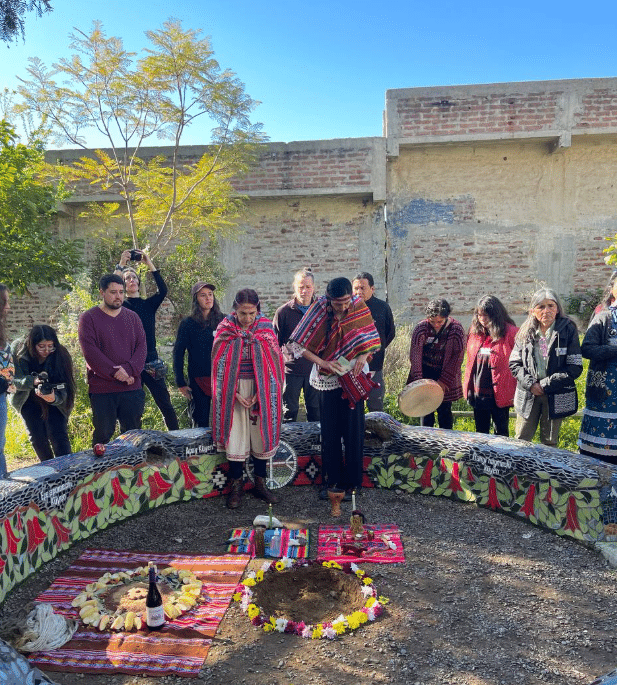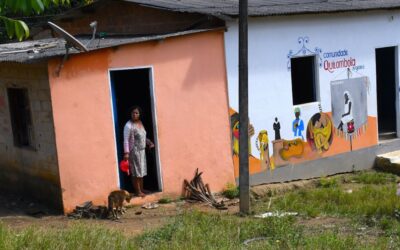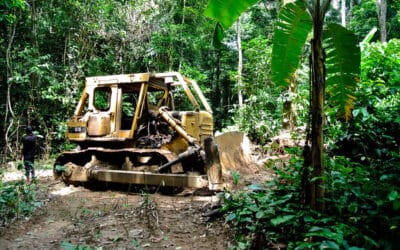By: Biomass Action Network
| Sep 3, 2025

Written by Janaina Uemura, GFC Climate Campaigner and Coordinator of BAN’s Latin America working group and Davi Martins, BAN’s International Advocacy Campaigner
At the end of August 2025, the vibrant port city of Valparaíso, Chile, became a convergence point for climate justice movements and NGOs at the 4th Climate Justice Latam and the Caribbean Meeting (Cuarto Encuentro Latinoamericano y del Caribe por la Justicia Climática), organized by the Platform for Latin American and Caribbean Climate Justice (Plataforma Latinoamericana y del Caribe por la Justicia Climática – PLACJC) and Demand Climate Justice (Campaña Global para Exigir Justicia Climática – DCJ). Members of EPN’s Biomass Action Network (BAN) were present alongside 14 civil society organizations and Indigenous leaders from across Latin America and the Caribbean for a powerful three-day gathering.
The mission was clear: confront the escalating climate crisis, expose the dangerous impacts of false solutions, and exchange and uplift successful experiences that offer real and just solutions from the ground up. This was more than a meeting; it was a confluence of voices, from the high Andes to the vast Pampas and the deep forests, all united by a common struggle against the extractive economic model.

Deep Listening and Shared Struggles
During the event, the most recent version of the False Solutions Map was presented, revealing that in Chile alone there are 30 projects that, while presented as climate action, actually reinforce extractivist models and fail to reduce global emissions. Alarmingly, six projects are located inside or adjacent to protected areas such as Chiloé National Park, Nevado Tres Cruces National Park, and Magallanes National Reserve, while others directly impact Indigenous territories, wetlands, and watersheds. The majority are financed by foreign capital, but several also benefit from public funds and international financial institutions such as the IDB, IMF, and CAF. As discussed in Valparaíso, Chile’s so-called “energy transition” does not represent a transformation but rather a reconfiguration of extractivism.
Through profound dialogues and meaningful rituals, the gathering was grounded in active listening. Participants forged deep connections by sharing the unique challenges faced in their territories. A central, unifying truth emerged: whether in the Andes, the forest, or the Pampas, the same capitalist machine is at work – destroying pristine biomes, displacing communities, and polluting the very ecosystems that safeguard life on our planet.

The conversations were guided by two non-negotiable principles:
1. Respect for Ancestry and Self-Determination: Climate justice is impossible without territorial and cultural determination for Indigenous peoples. Their wisdom and leadership are primary and must be central.
2. Gender Justice: The fight against gender-based violence was highlighted as an extremely urgent issue that must be integrated into both public policies and international climate agreements.
Combating extractivism is necessary, but it cannot come at the expense of these primary needs.
A Deep Dive into the Biomass Industry in Chile
The second day featured a dedicated session focusing specifically on the biomass industry. Unlike the broader and more diverse climate justice group, this meeting brought together Chilean NGOs and Indigenous representatives, eager to exchange knowledge. The discussion revealed Chile’s forestry model as an emblematic example of the neoliberal agenda’s expansion in Latin America. Companies like ARAUCO and CMPC, now giants with operations across the continent, have their roots in policies enacted during the Chilean dictatorship of the 1970s. They represent the modern evolution of colonial expansion, a common trait for extractive companies throughout the region. The group explored how this history continues to impact Chilean communities today.

Mobilizing for Action: A United Front
A key part of the agenda was planning for the International Day of Action on Big Biomass which will take place on October 21 2025. The energy was palpable as we discussed how to present a united global front while empowering each territory to speak in its own voice—to raise its voice in its own narrative, language, and imagery.
Ideas flourished:
- Leveraging the False Solutions Map to visually expose the harmful biomass projects impacting communities.
- Illustrating the link between consumer countries and the devastating local impacts on producer countries
- Producing a short documentary featuring stories and testimonies from impacted people across the region, an idea to be developed further in upcoming meetings.

Building a Movement: The Path Ahead
A key outcome was the recognition that the BAN Latin America and the Caribbean community is a living, evolving process under construction. While initiated by and with strong leadership from Chile, the vital work now is to consolidate and expand this network into other Latin American countries.
The gathering also provided clarity on the road to COP 30. The climate justice community present is highly organized and prepared, but currently has no unified focus or disposition to work on a formal COP strategy. Opinions on multilateral engagement are diverse, and no final decision was made on participation.
Nevertheless, the path forward is clear. Many allies will attend the parallel People’s Summit, presenting a crucial opportunity to advance a critical bioeconomy agenda. Tools like the False Solutions Map will be essential in escalating our call-to-action, serving as a powerful reminder of the devastating impacts false solutions like biomass energy have on Latin American and Caribbean territories.
The meeting in Valparaíso was a significant first step. It was a space to listen, to understand, to learn, and to begin weaving a stronger, more resilient network of allies committed to a just future—one where life is valued over profit, and where solutions are truly for the people and the planet.
Get involved
If you are interested in participating in the Biomass Action Network’s Latin America Working Group please contact sophie@environmentalpaper.org




